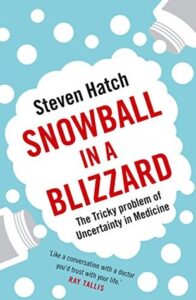 Snowball in a Blizzard, Steve Hatch
Snowball in a Blizzard, Steve Hatch
Snowball in a Blizzard is a great examination of something that goes overlooked far too often — or blown out of proportion in ways that serve weird fringe agendas: the fact that very little in medicine is certain, and it’s not possible to put numbers on many/most things about biology. People forget that when looking for certainty about how to reduce their risk of cancer, or blow it up into something quite different when they want to argue against the importance of vaccines… and it’s really important to understand why there is uncertainty in medicine and what it really means, if you want to make truly informed decisions about your own healthcare. Informing people about this is Steve Hatch’s aim here, and I think he does a great job.
There are one or two points which have suffered a bit in time — for instance, the Rosenhan experiments that he leans on heavily to make a point or two have been discredited, with Susannah Cahalan’s The Great Pretender arguing pretty convincingly that Rosenhan falsified much of the data in his study, which was never run in the way he described. There are also some references to SARS, which are pretty apocalyptic… But broadly speaking, Hatch’s points hold true.
There’s some really fascinating stuff here that I knew very little about. For example, screening mammography — mammograms for people who have not discovered lumps or had any other symptoms of breast cancer — is, on balance, probably harmful for most people. This doesn’t mean that diagnostic mammography is a bad thing, but the indiscriminate screening of everyone in certain groups includes far too many people who are at too low a risk of cancer. Thus, false positives are common, and a lot of mental distress results — and sometimes worse, with people even ending up having unnecessary mastectomies.
Hatch explains the statistics underlying evidence-based medicine really well. I don’t have a good instinctive grasp of statistics, and never have, and this book helped some of these concepts lodge in my brain — which was nice, because I had an exam coming up at that point on exactly some of these types of statistics. I think it would be really useful for anyone who wants to understand better how uncertainty in medicine works and what that might mean for making decisions about your own care.

Leave a Reply